- Home
- Patrick E. Andrews
Crossed Arrows (A Long-Knives Western Book 1)
Crossed Arrows (A Long-Knives Western Book 1) Read online
It is the 1890s, and the Indian Wars have finally come to an end. Captain Mack Hawkins is ordered to take command of one of the first units of the recently organized U.S. Scouts. For the first time in American military history, these tribesmen are being allowed to enlist as fully-accepted soldiers in the United States Army. Hawkins’ new command is the Kiowa-Comanche Detachment, and he has little time to turn his team of former nomadic prairie warriors into an efficient, disciplined fighting unit. If he doesn’t, they're sure to be wiped out on their first mission of tracking down the outlaws who stole an army payroll.
CROSSED ARROWS
THE LONG-KNIVES 1
By Patrick E. Andrews
Copyright © 2016 by the Andrews Family Revocable Trust
First Smashwords Edition: February 2016
Names, characters and incidents in this book are fictional, and any resemblance to actual events, locales, organizations, or persons living or dead is purely coincidental. All rights reserved. No part of this book may be reproduced or transmitted in any form or by any means, electronic or mechanical, including photocopying, recording or by any information or storage and retrieval system, without the written permission of the author, except where permitted by law.
Our cover features a detail from The Courageous Ride of Sgt Thomas, painted by Andy Thomas, and used by permission.
Andy Thomas Artist, Carthage Missouri. Andy is known for his action westerns and storytelling paintings and documenting historical events through history.
This is a Piccadilly Publishing Book ~*~ Series Editor: Ben Bridges
Text © Piccadilly Publishing
Published by Arrangement with the Author’s Agent.
This book is dedicated to the memory of First Sergeant I-See-O, Kiowa Detachment, United States Scouts
Date of Birth Unknown
Died 11 March 1927 at Fort Sill, Oklahoma
Excerpt from U.S. Army Regulations of 1890
481. Indians employed as scouts will be enlisted for periods of three years and discharged when the necessity for their services shall cease. While in service they will receive the pay and allowances of cavalry soldiers and an additional allowance of 40 cents per day, provided they furnish their own horses and horse equipments.
482. Department commanders are authorized to appoint the sergeants and corporals for the whole number of enlisted scouts serving in their departments, but such appointments must not exceed the proportion of one first sergeant, five sergeants, and four corporals for every sixty enlisted Indian scouts.
483. The number of Indian scouts allowed to military departments will be announced from time to time in orders from the Headquarters of the Army.
484. The enlistment and reenlistment of Indian scouts will be made under the direction of department commanders. The appointment or mustering of farriers or blacksmiths on the rolls of Indian scouts is illegal.
485. In all cases of enlistment of Indians the full Indian name, and also the English interpretation of the same, will be inserted in the enlistment papers and all subsequent returns and reports concerning them.
Prologue
It was a late spring evening in 1890 when a detachment of cavalrymen rode slowly into the business district of the small town of Clayville in the Oklahoma Territory. The man at the head of the column wore the straps of a captain on his shoulders, indicating an officer and a gentleman. But his rugged countenance, that included a nose that had obviously been broken more than once, made it seem the rank of sergeant would be more his style of command and soldiering.
The troopers continued down the street deliberately and carefully; each man casting careful glances at rooftops and into the growing shadows between the buildings. This was a hostile area that gave every indication of a possible ambush.
The men at the rear of the formation had three extra horses that were obviously government mounts. The animals bore the U.S. brand on their left shoulders, and military saddles and accouterments on their backs. The horses had been taken from a livery barn at the edge of the community just minutes previously.
Captain Mack Hawkins held up his hand to give a silent order to halt. He surveyed the street of the small hamlet with practiced eyes. Only a couple of loafers stared in unabashed curiosity at the soldiers. One building, a saloon, was lit up with the sounds of loud talking and an occasional drunken shout coming from within. The rest of the town’s businesses were closed up tight and dark.
Hawkins spoke in a soft voice. “Sergeant.”
“Yes, sir?” the noncommissioned officer replied as he rode up to join his commanding officer.
“The deserters’ll be in there wetting their whistles no doubt,” Hawkins said, pointing to the saloon.
“I’m sure you’re right about that, sir,” the sergeant said. “How do you figure on taking ’em?”
“Send a couple of men around to the back. Have one trooper stay with the recovered horses, and you wait out here in front with the rest of the patrol.”
“Are you going in there alone, sir?” the sergeant inquired, already knowing the answer to the question. Captain Mack Hawkins was known as an officer who looked for trouble.
“That’s my idea, Sergeant.”
“Now, sir, we ain’t really sure how many unfriendly folks might be in there. Them deserters we’re after may have friends and family in this town.”
“That’s right,” Hawkins replied. “But that’s what will make it interesting.”
“Cap’n, if you don’t mind me saying so, you should—”
Hawkins interrupted. “Do you understand my orders?”
“Yes, sir!”
“Carry on.”
“Yes, sir!” the sergeant replied, saluting. He turned to move the troopers into position.
Hawkins pulled a cheroot from his pocket and bit off the end. He spat it out, then casually lit the stogie. After a couple of draws, he eased his horse up to the hitching rack in front of the saloon and dismounted.
Captain Mack Hawkins, U.S. Cavalry, was a tall man with a deep chest and thick shoulders. Gray was sprinkled through his dark hair as well as the handlebar moustache that drooped along the sides of his mouth. He had a certain gracefulness in his step that gave an impression of strength and unusual athletic ability. During his days as a common soldier, he had been the bare-knuckles boxing champion of his regiment three years in a row. Those supervised brawls accounted for his bent nose.
Hawkins crossed the boardwalk and stepped through the batwing doors into the noisy, smoky interior of the saloon. He spotted the three men in army uniforms he was looking for at a table near the center of the room. Hawkins, the cigar clenched between his teeth, called out. “How’re you doing, Riley? And you, Johnson and Barton?”
The three soldiers jumped up and glared in nervous anger at the newcomer. The largest, the one named Riley, was not uneasy. He gave Hawkins an insolent look. “You’re kind of out of your neck of the woods, ain’t you, Cap’n?”
“This is part of the U.S. here, isn’t it?” Hawkins asked.
“Yeah,” Riley answered. “I hear tell that the Oklahoma Territory is American.”
“And I’m in the United States Army,” Hawkins pointed out. “That means there isn’t a neck of the woods between the Atlantic and the Pacific or Canada and Mexico that isn’t my place to be in.”
A tough-looking civilian sneered over his beer. “The town of Clayville don’t belong to you, soldier-boy.”
“My business here doesn’t concern you,” Hawkins said. “So just shut your mouth.”
“Maybe you want to shut it for me,” the man said, getting up and walking toward him.
Hawki
ns stepped forward in long strides and slammed a gloved right hand straight into the civilian’s face. The man’s eyes rolled up as he staggered back and hit the bar before sliding down to rest beside an overturned spittoon.
The captain turned his gaze to the three soldiers. “You’re under arrest and charged with desertion and stealing government property. Drag your butts out to the street.”
“I ain’t going no place with you,” Riley said. “The days I fetch and jump for a pair of shoulder straps ended when I took off from Fort Lone Wolf a week ago.”
“That goes for us too,” Johnson said, taking courage from Riley’s defiance.
“You bet it does,” Barton agreed.
Hawkins was slightly amused. “I wish I could say that I admire your grit, but right now I don’t have the time to really appreciate it.”
“Don’t you think it’d be best for you if you just went away?” Riley asked.
“I intend to do that as quickly as I can,” Hawkins said. “In the meantime, let’s not forget that you owe the U.S. Government the time on the rest of your enlistments along with the horses, weapons and equipment you took with you.”
“You know what we think of that, don’t you, you son of a bitch!” Riley growled.
“I sure do,” Hawkins replied cheerfully. He chose Barton first because he was closest. A backhand swing knocked the soldier over the nearest table. The drinkers there jumped back with curses and yells of protest.
Riley moved forward without hesitating. He charged into the captain with both fists pumping, hoping to use his large size to overwhelm him. Hawkins, who had stood his own in many a barracks room brawl as well as the boxing ring, danced back and peppered Riley’s face with vicious, rapid punches. He drew blood immediately and celebrated the event with a solid left cross to the deserter’s jaw. The impact of the blow spun Riley sideways, but he quickly recovered and moved back out of harm’s way, shaking his head to clear his senses.
Johnson, not wanting a face-to-face confrontation with Hawkins, chose that moment to hit him from behind. After delivering a glancing blow, he leaped up on the officer’s back and locked his wiry arms around his neck, hoping to choke him into unconsciousness.
Hawkins spun around rapidly, throwing his attacker on top of the bar. Barton slid down the wet surface and collided with a kerosene lantern, knocking it to the floor. The flammable liquid spilled and lit up immediately. Flames leaped up from the wooden planking as Riley tried again. This time he received a heavy boot to the knee, and he went down screaming in pain.
Hawkins, with one eye on the growing fire, figured it was time to stop the fun. He drew his revolver and threw down on the three. “I’ve already got you under arrest. Get outside or I’ll put a U.S. issue forty-five slug in each of your useless carcasses. Now godamn it! Move!”
The three deserters, their hands above their heads stumbled out onto the street. They were immediately grabbed and cuffed by the sergeant and a couple of troopers. The prisoners were placed on the same horses they used to run away from the Army.
The sergeant quickly sent for the soldiers behind the saloon and formed up the detachment. Hawkins mounted his horse and rode to the front of the column. After a quick glance to make sure his men were ready, he ordered, “For’d, yo!”
The cavalrymen cantered out of town to head back to their home post of Fort Lone Wolf, Indian Territory. Hawkins glanced to the rear and saw the entire business district of the town in flames. He looked at the sergeant. “Isn’t it funny how sometimes things get completely out of hand?”
The sergeant sighed. “Damn, sir!”
Chapter One
The young soldier, fidgeting from utter boredom, occupied a camp chair on the regimental headquarters building porch. Strangely enough, the trooper was not there at the whim of some sergeant. He had actually won the right and privilege to be at that particular location. This occurred following the previous afternoon’s guard mount when he was honored by being chosen colonel’s orderly. During that most strict of inspections, the officer of the day picked him as the sharpest soldier in the formation. The slim young man with the fuzz of a scraggly moustache above his lip, had been very proud and pleased. But now, as he endured long, slow hours on the job, he wondered if it were really worth it.
His pals who hadn’t looked quite so soldierly had gone on to guard duty. They walked their posts during the night, but were now napping and taking it easy in the guard room while he spent the day running errands for the regimental staff. It was also irritating to have to jump up from his chair to salute each and every officer walking across the porch to enter the building. And there were plenty of them.
The clump of heavy cavalry boots caught his attention once more, and the young soldier leaped to his feet. He looked down and saw Captain Mack Hawkins ascending the steps. Everyone in the garrison was talking how the captain had tracked down the three deserters then gave each a good beating before dragging them back to Fort Lone Wolf for court martial. The captain was known as someone not to fool with.
The soldier fearfully saluted. “Good morning, sir!”
Hawkins returned the salute. “Good morning, Trooper.” He took a close look at the lad. He seemed very young to the veteran captain. “How long have you been in the Army?”
“Well, sir, I reckon it at six months, sir.”
“So you made colonel’s orderly at yesterday’s guard mount, did you?”
“Yes, sir.”
“Why that’s a good job on your part, Trooper,” Hawkins said with a friendly grin. “Not too many fellows with less than a couple of years’ service could have done that.”
Now a surge of pride coursed through the youngster. “I worked real hard, sir. I shined my boots good and made sure I knowed my general orders and ever’thing. I ironed my clothes just before we fell out so’s the creases would be sharp.”
“Well done!” Hawkins said. “You just keep soldiering like that and you’ll be sporting chevrons on your arms before you know it.”
“Yes, sir!”
“But don’t forget to pay the same amount of attention to your field craft,” Hawkins counseled him. “A good soldier is the kind that not only can be colonel’s orderly in garrison, but knows how to conduct himself properly on campaign.”
“Yes, sir!”
“I think you’ve got what it takes to do both. Keep up the good work, Trooper.”
“Thank you, sir!” the young soldier said. Now being colonel’s orderly seemed a lot better, and he resumed his seat on the camp chair with a feeling of pride and accomplishment.
Hawkins went inside the building, stopping at the regimental sergeant major’s desk. “I’m here to see the colonel.”
“Yes, sir,” the sergeant major said. He was a large man who wore the huge chevrons of his rank well. “He said to send you in the minute you showed up.”
“How do things look?”
“You’re gonna get your heels locked, Cap’n,” the senior noncommissioned officer answered in a frank manner. He and Hawkins had known each other for many years. In fact, they had been corporals together in the same troop during the war against the Apache tribes.
“I expected that,” Hawkins said. He adjusted his cap, grasped his saber to keep it from clanking as he walked, and marched up to the regimental commander’s door. He knocked twice.
“Come!”
Hawkins entered the office, and marched up to the desk, coming to a foot-stomping halt. “Captain Mack Hawkins reporting to the regimental commander as ordered, sir,” he said, executing a salute so sharp it almost cracked.
Colonel John Bennington spoke tersely. “At ease.” He was both the commanding officer of the cavalry regiment and the post commander of Fort Lone Wolf, Indian Territory.
Hawkins had snapped into the position of at ease by moving his right foot six inches to the rear, slightly bending his left knee while clasping his hands to the front. The captain was the picture of the prototypical professional soldier. The ladies of the post
thought the bachelor captain handsome in spite of his bent nose.
“Do you know why I’ve summoned you here, Captain Hawkins?” The strain in the colonel’s voice was evident.
“I have an idea, sir.”
“Quite a few messages have come into this headquarters in the past several days, Captain Hawkins.”
“Yes, sir?”
“They’re originally from Clayville, Oklahoma Territory and forwarded to me through various echelons,” Colonel Bennington said. “You know what that means, do you not?”
“Again, sir, I have an idea.”
“On the contrary, I don’t think you completely realized the serious implications of this development, Hawkins. Those missives with dozens of endorsements have been perused and reviewed through the military division and department headquarters before they got to me.”
“Yes, sir.”
“You can be certain that copies have been forwarded to the War Department in Washington as well,” Bennington said wearily. “They all know what happened when you arrested those deserters in Clayville. A United States marshal from the Federal court in Guthrie was sent to investigate.”
“Nothing to worry about, sir.”
“For the love of God, Hawkins!’ Bennington shouted. “You burned that godamned town down!”
“I respectfully beg your pardon, sir, but the whole town didn’t burn down. Just the business district.”
The colonel almost choked. “Do you really think that make a difference in the seriousness of the matter?”
“Well, sir, in truth I didn’t burn anything down. A fire was accidentally started while I was arresting the three deserters Riley, Johnson and Barton.”
“Witnesses interviewed by the marshal said you walked into that saloon by yourself and instigated a fist fight with those three men.”
“Riley started the trouble, sir,” Hawkins insisted. “I just entered the establishment and ordered him and the others outside to return to Fort Lone Wolf with me.”
“I know you, Hawkins. You went into that saloon hoping to have an altercation. If you had gone in there with several men instead of alone—” He stopped speaking as he fought for self-control. After a moment he reached for a packet of papers and opened it up. “This is your service record, Hawkins.”

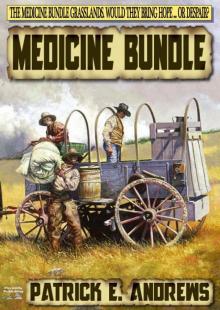 Medicine Bundle
Medicine Bundle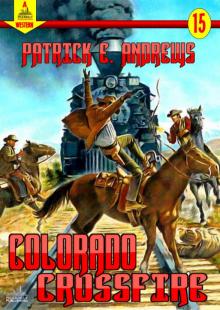 Colorado Crossfire
Colorado Crossfire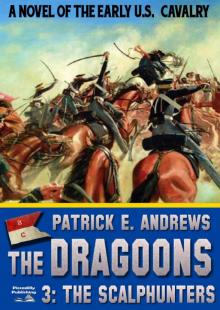 The Dragoons 3
The Dragoons 3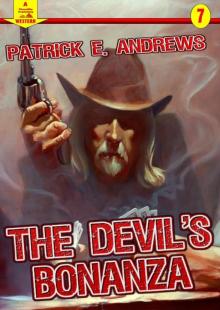 The Devil's Bonanza (A Piccadilly Publishing Western Book
The Devil's Bonanza (A Piccadilly Publishing Western Book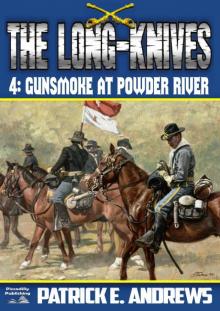 Gunsmoke at Powder River (The Long-Knives #4)
Gunsmoke at Powder River (The Long-Knives #4)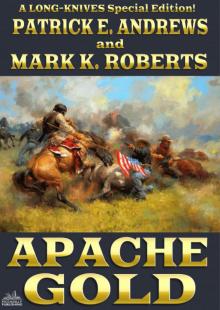 The Long-Knives 6
The Long-Knives 6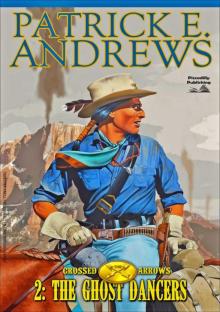 The Ghost Dancers (A Crossed Arrows Western Book 2)
The Ghost Dancers (A Crossed Arrows Western Book 2)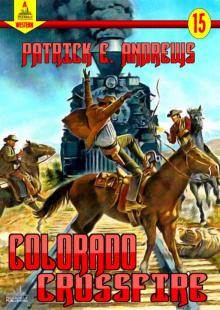 Colorado Crossfire (A Piccadilly Pulishing Western Book 15)
Colorado Crossfire (A Piccadilly Pulishing Western Book 15)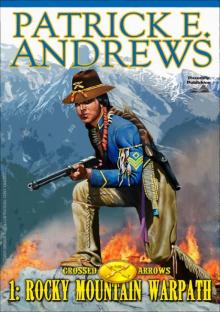 Rocky Mountain Warpath (A Crossed Arrows Western Book 1)
Rocky Mountain Warpath (A Crossed Arrows Western Book 1)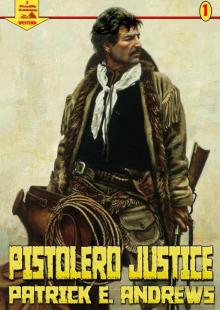 Pistolero Justice (A Piccadilly Publishing Western
Pistolero Justice (A Piccadilly Publishing Western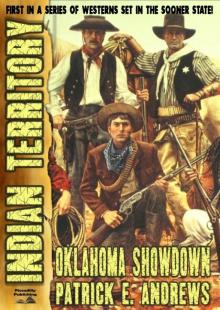 Oklahoma Showdown (An Indian Territory Western Book 1)
Oklahoma Showdown (An Indian Territory Western Book 1)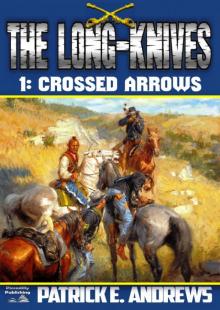 Crossed Arrows (A Long-Knives Western Book 1)
Crossed Arrows (A Long-Knives Western Book 1)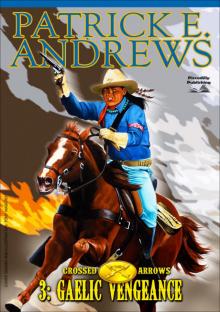 Crossed Arrows 3
Crossed Arrows 3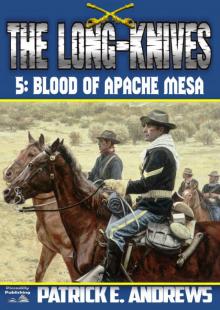 Blood of Apache Mesa
Blood of Apache Mesa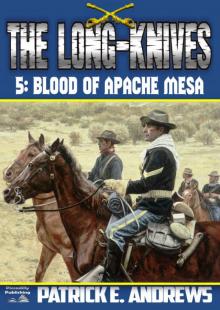 The Long-Knives 5
The Long-Knives 5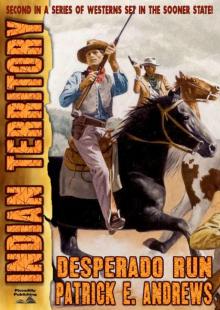 Desperado Run (An Indian Territory Western Book 2)
Desperado Run (An Indian Territory Western Book 2)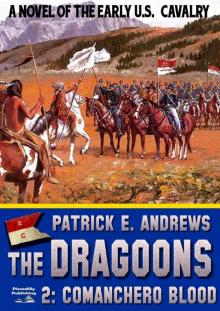 Comanchero Blood (A Dragoons Western Book 2)
Comanchero Blood (A Dragoons Western Book 2)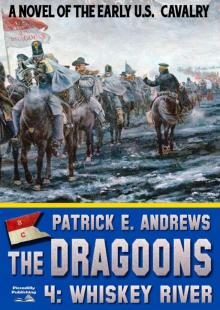 The Dragoons 4
The Dragoons 4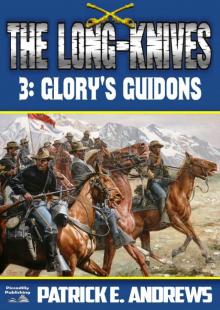 Glory's Guidons (The Long-Knives US Cavalry Western Book 3)
Glory's Guidons (The Long-Knives US Cavalry Western Book 3)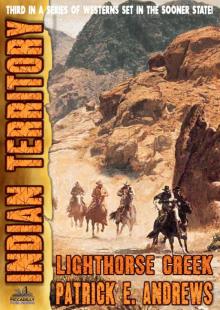 Indian Territory 3
Indian Territory 3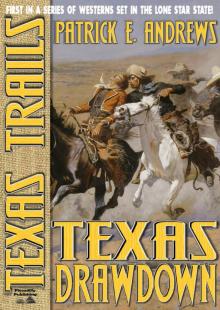 Texas Trails 1
Texas Trails 1